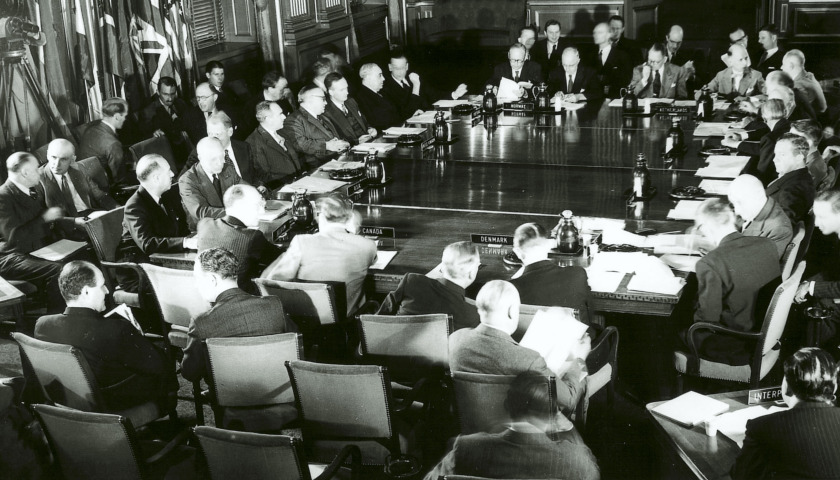by Robin Burk
Post-World War II institutions are unraveling, and there’s panic here and abroad about it.
The transnational Left is starting to lose the means by which it seeks to shape the world without voter involvement. And the neo-cons are seeing their means of geopolitical intervention weaken.
It’s worth reading what Matthew Continetti wrote recently, after the NATO heads of state meeting and in light of the Tory election win in the UK. Continetti is worried about the “demolition” of the post-war order, which he grudgingly acknowledges is due in part to external pressures by actors like China and Iran but primarily is due, he asserts, to the “inward turning of the United States” to a foreign policy that is “haphazard and improvisational, contradictory and equivocal.” Continetti demonstrates how only understanding half of what’s occurring can badly distort one’s analysis.
From Turtle Bay to Brussels, from Washington to Vienna, the decay of the economic and security infrastructure of the postwar world has accelerated in recent weeks. The bad news: As the legacy of the twentieth century recedes into the past, the only twenty-first century alternatives on offer come from an authoritarian surveillance state.
He’s wrong. There is, in fact, another 21st-century alternative, and it’s one that has been growing out of the very forces that are accelerating that decay.
Continetti’s assumption is that the fundamental design of the post-World War II “economic and security infrastructure” was sustainable. That infrastructure has two salient characteristics: It attempts top-down control of major global systems and it is populated and run primarily by unelected administrative elites.
Sounds a lot like the national attempts at control in many countries. And all of them are unsustainable today. It’s why we’re seeing resistance from middle classes across a spectrum of countries.
The evidence for unsustainability is there before the eyes of the administrative elites, but they are blind to it.
An Utterly Inadequate Design
Consider the entry “Complexity Rising: From Human Beings To Human Civilization, a Complexity Profile” in the 2002 UNESCO-sponsored Encyclopedia of Life Support Systems. As the title suggests, the volume is intended to provide an optimistic path forward for major international programs. And yet, as the author painstakingly describes, increased complexity arises from such things as technologies to the point where neither top-down control nor a view of economies and societies that only focuses on individual elements is sufficient.
Yaneer Bar-Yam optimistically ended his entry by focusing on humanity as a single organism, a metaphor the UNESCO leaders no doubt approved. But the evidence points to a different conclusion. We are first and foremost members of a wide variety of networks that connect us and through which we interact. Social networks ranging from our families to local communities, to dispersed communities of interest, to polities. Financial networks that range from local credit unions to credit card mechanisms that span the globe. Information flows at all levels of origin and distribution. And global trade that no longer is limited to major import and export shipments but now includes Etsy crafts ordered online and sent in modest packages.
Why does this matter? Because in the years after Bar-Yam wrote that complexity entry, we’ve learned more from the new discipline of mathematical networks. Among other things, we’ve learned that there are two very important characteristics of complex adaptive networked systems like societies and economies. First, they have system-wide behaviors that cannot be fully predicted and therefore cannot be controlled. What cannot be predicted cannot be controlled and will often surprise us. And second, they often appear to be quite robust in the face of challenges or damage, right up to the point where they unravel rapidly and deeply.
Do you see the double error that Continetti is stuck in? He does not recognize that the post-World War II “economic and security infrastructure” is utterly inadequate to the task of managing either economies or geopolitical security today. Quite the opposite: the efforts of transnational elites at wider and deeper control of our everyday lives have created the very conditions that foster catastrophic unraveling.
Redundancy on the Rebound?
It’s easy to see the absurd overreach of the EU minutely controlling the size of bananas that British consumers can purchase. It takes a little more analysis to see that the grander ambitions suffer from the same flaws. What network science shows us is that top-down attempts at control remove the resiliency (not to mention the antifragility) of any complex networked system. So, by the way, do lopsided policies ostensibly supporting free markets that quietly, instead, embed entrenched advantages to some players.
Resiliency in networks comes from having local redundancy. If you rely only on the power grid, you’re not very resilient to a major weather emergency or cyber-attack on it. Having some backup power capabilities, and ways to get things done without power for a while, makes you much more resilient to such events.
Local and regional resiliency in networks has a similar impact on the larger networks of which they are a part. With enough redundancy, even major networks can work around significant damage. But short of that, if there is enough local and regional redundancy they can, if need be, decouple fully or partially into smaller networks that continue to function.
For decades many NATO partners not only ignored their financial commitments but also allowed their militaries to atrophy. Some members went so far as to enable flows of sensitive technology to countries like Iran. Continetti has it backward. NATO isn’t being demolished today. It was brought to the brink of utter unraveling by such actions over several decades. The current U.S. administration’s pressures are causing some members slowly to restore some redundancy in NATO’s funding and training, and thereby restore some life to the coalition.
It is no coincidence that this recent NATO heads of state meeting for the first time began to jointly reject Chinese geopolitical moves.
It’s not just NATO at stake, however. The Trump administration has a strong focus on the coordinated use of all means of national power in order, first and foremost, to ensure resilience here at home. Restoring domestic manufacturing, ending unfair trade practices and eyeroll-causing favoritism to today’s China, insisting on free maritime movement through the south Asian waters, lightening heavy-handed regulations that choke innovation and the role of small businesses in communities . . . all of these are designed to restore resilience in our own society and economy first.
A Return to Community
As we restore our own resilience we are better positioned to form effective, mutually beneficial coalitions with smaller networks: with the UK after Brexit, with the Anglosphere, with any other partners who are willing to enter into fair economic, military, and geopolitical relationships. I sincerely hope that a renewed NATO is among those. But with it or without it, the days of the Davos crowd as transnational power wielders are shrinking. And it’s not Trump who’s caused that. It’s smartphones and information flow and the disruptive technologies that enable them.
Continetti is right about one thing. A massively intrusive surveillance state is a very real and daunting possibility. But as the spread of protests from Hong Kong onto the Chinese mainland’s Guangdong province show, today’s tech can be used against such a state if it is sufficiently prevalent and is wielded in time. What such pushback requires is a cause that people see as affecting them and those with whom they are directly connected.
Hong Kong wants the local autonomy promised it in formal agreements. Chinese in Guangdong hear about the Hong Kong protests, learn a bit about the brutal suppression by their government in Xingjian, and want to ensure they are not similarly treated. Britons want to be able to import bananas as they choose, thank you very much. And American communities in the heartland want the dignity and local connections that jobs and small businesses provide.
The current unraveling of post-World War II transnational structures is very real and, given the choices of the administrative elites that run and benefit from them, is inevitable. Nonetheless, very good outcomes can emerge if we take heed and restore local, regional, and national resiliency in our various countries.
But between now and then, things will grow more and more chaotic for a while. So beef up your personal and community connections and be ready for the possibility that, as with major weather events, there may well be a period of localized damage. The good news is that we can indeed ride this out together if we’re willing to see what is actually going on.
– – –
Robin Burk started her career wearing bell bottom jeans in the basement of the Pentagon, where she had the challenging privilege of interacting with computing legend Grace Hopper, and in Silicon Valley, where she wrote one of the first commercially deployed Internet protocol software stacks. Read more about Robin here.
Photo “First Session of the North Atlantic Council, 1949” by NATO.




